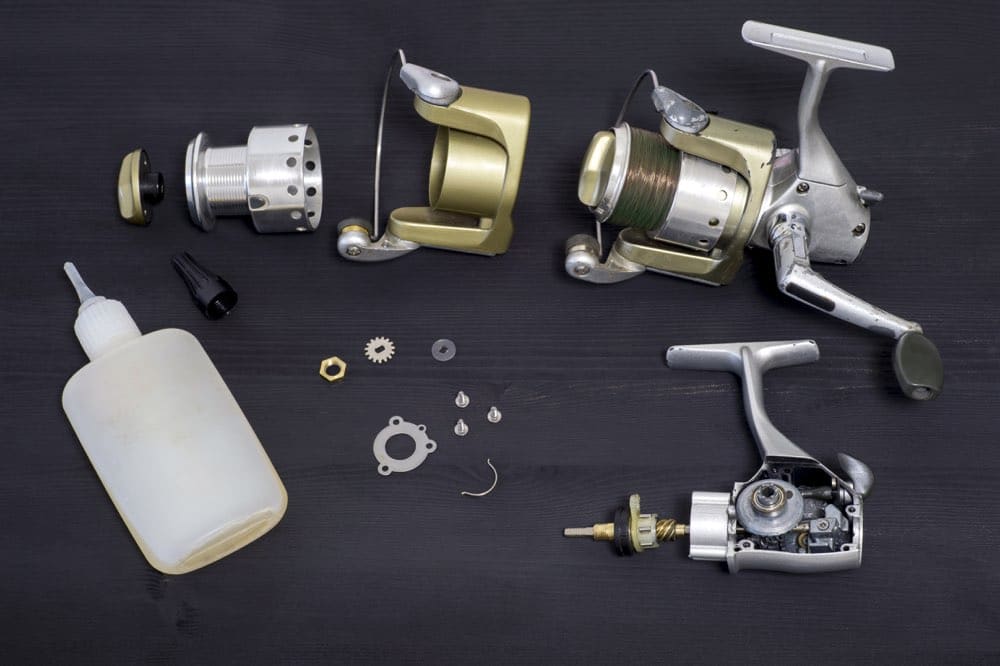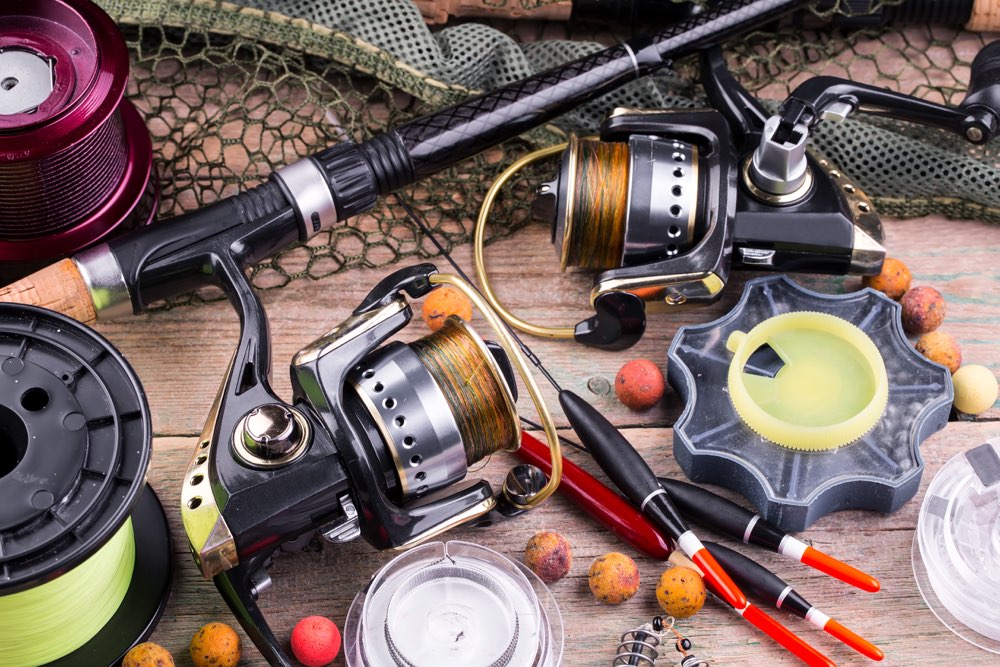If you want your fishing reel to work properly and last as long as possible, you are going to need to maintain your gear.
Learning how to oil your spinning reel isn’t the most fun thing in the world at first, but once you have the hang of it, you’ll be able to repeat the process easily and quickly.
In this article, we’re going to teach you exactly how you can oil your spinning reel properly and make sure that it is always performing its best.
It won’t take you long to learn, and once you do, you and your equipment will be all the better for it.
Read on for the full tutorial.
Contents
What to Avoid
There are some things that you shouldn’t be doing when oiling your spinning reel.
For starters, we strongly suggest that you stay away from degreasers or soaps because they can leave residue on your reel or even cause serious damage.
The best oils for lubricating your fishing reels are those that are designed specifically for reel care.
You can find reel cleaning and maintenance kits at most outdoor retailers and hardware supply stores, but you can also get your hands on the following items for the same effect:
- Reel oil (the correct lubricant for rods)
- A clean microfiber cloth
- Reel cleaning solvent
- Cotton swabs
- Paper towels
- A light bristle brush
- Your spinning reel
Once you have either a cleaning kit or the items mentioned above, you’ll be ready to oil your spinning reel.

Oiling Your Fishing Reel: A Step-By-Step Guide
Like we discussed earlier, oiling your fishing reel can be quite frustrating at first, but once you get the hang of it – which shouldn’t take very long at all – you’ll be able to maintain your reel with ease.
Here’s how you go about doing just that:
Step 1
Start by preparing your workspace.
Set it up in a well-lit area and lay a clean cloth on an even, stable surface on which you can work your reel.
Step 2
Now it’s time to clean and oil your bail.
Open it up, apply cleaning solvent to the bail’s connection points, as well as the line roller, then lightly scrub it down with your light bristle brush.
Once you’ve done that, you can wipe it dry and add a few drops of special reel oil to the aforementioned connection points.
Be sure to open and close the bail a few times so that the oil can be worked in.
Step 3
Next, you will need to clean the spool and oil it.
To do this, unscrew the drag knob and remove it, then take out the spool from the body of the reel.
Apply cleaning solvent to the drag knob, the interior of the spool, as well as any other exposed areas.
Wipe away any excess oil, debris, and dirt, and use your cotton swabs to wipe away grime from the crevices.
Place a few drops of reel oil onto the gears and main shaft, and when you are ready to reassemble everything, place the spool back onto the body of the reel and replace the drag knob.
Step 4
Now you will have to oil the bearings found in the reel body.
Start by removing the screw cap on the body of the reel, then unscrew the handle and move it away.
Then, use a cotton swab to wipe the ball bearing down and get rid of any old lubricant and dirt.
Finally, apply a single drop of oil to each of the bearings, as well as to the joints on the reel handle.
You can then reassemble the handle and screw cap.
Step 5
Lastly, you’re going to oil the body of the reel.
You’ll want to wipe the entire reel down with a light layer of oil, which will add a layer of protection and help repel water when you are actually fishing.

Should You Oil Your Spinning Reel?
This is a question that many anglers ask themselves, and the answer is quite simple: yes, you absolutely should.
Some models of fishing rods should even be oiled right after you have purchased them, before you use them for the first time, because their reels might come with little to no oil.
Reels consist of quite a few parts, and the moving ones are the most important of these parts.
Oil for fishing reels works to reduce temperature and friction and protect the parts from harmful corrosion – using oils with anti-corrosion properties can be very useful.
Before you oil your spinning reel, it is essential that you clean it thoroughly.
Adding oil to dirt or any sort of debris is going to do far more harm than good because you will essentially be trapping it in the oil, which will then rub against the delicate parts of the reel in use, causing severe damage.
Remember that you don’t want to use any harsh detergents or chemicals when you are cleaning your reel.
Again, we strongly suggest that you use special reel products for cleaning purposes – they might cost you a few extra dollars, but they are going to save you even more money than you would otherwise have to spend on repairs.
FAQ
What oil can you use on spinning reels?
Synthetic oils are your best bet when it comes to oiling your spinning reel.
This is thanks to their lubricating and light properties that allow them to smoothen the moving parts of your reel with ease, preventing any unnecessary and harmful friction.
We can’t stress enough the importance of avoiding reel oils that contain TFE at all costs.
TFE is an additive that can be very harmful to your reel when you use it, so be sure to look for any bottles that contain that ingredient, and put them back on the shelf if they do.
Can you use WD-40 on spinning reels?
WD-40 is a degreaser that breaks down oil and grease, and you should never use it to lubricate your reel.
A general rule of thumb is to lightly grease your gears and oil everything else since too much oil and grease can burden the spool and greatly reduce its casting distance.
With that being said, feel free to use WD-40 on your reel when you are performing your yearly maintenance.
It’s not going to destroy the reel, and you can use it as a substitute for a cleaner to un-stick parts.
How often should you oil your spinning reel?
You should perform basic spinning reel maintenance and rod cleaning after every time that you use your fishing rod, and at least once a year, you should perform a more comprehensive cleaning.
The average angler can get away with doing a full cleaning once or twice a year, while professionals will generally perform one several times annually.
Is DIY oiling of fishing reels worth it?
DIY oiling your fishing reel can be just as effective as taking your rod into a professional and having them do it for you, and it can also save you some cash in the long run.
If you have the means and are able to get your hands on the necessary materials or a cleaning kit, you are more than welcome to oil your fishing reel by yourself.







